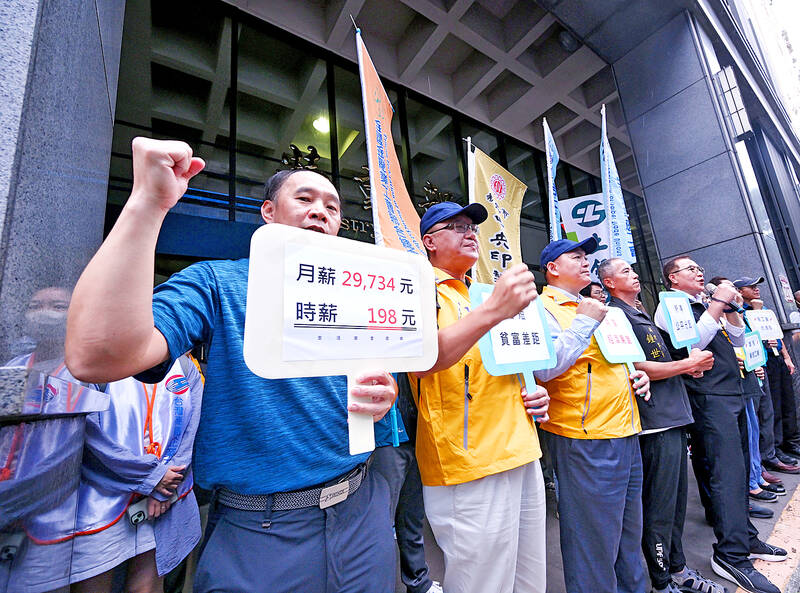The Ministry of Labor yesterday announced that the minimum monthly wage would rise for a 10th consecutive year next year, although by less than what labor groups had been calling for.
Starting on Jan. 1, the minimum monthly wage is set to increase 3.2 percent to NT$29,500, while the minimum hourly wage would climb by the same percentage, from NT$190 to NT$196, the ministry said.
Both adjustments still require approval from the Executive Yuan, which is expected to be granted.

Photo: Fang Pin-chao, Taipei Times
The announcement followed a review by the Minimum Wage Deliberation Committee, which considered factors including growth in the consumer price index (CPI) and GDP.
The Directorate-General of Budget, Accounting and Statistics (DGBAS) recently raised its GDP growth forecast for this year to 4.45 percent, up from a previous estimate of 3.1 percent, citing stronger-than-expected export performance.
The DGBAS also forecast that the CPI would grow 1.76 percent this year.
Labor groups felt the wage increase should have been closer to 4 percent.
They had urged the ministry to raise the minimum monthly wage to NT$29,734 and the minimum hourly wage to NT$198, saying that stronger increases were needed to help workers cope with rising living costs and to ensure they shared in the benefits of economic growth.
Adjustments of that size would better reflect inflation and increase the purchasing power of low-income workers, thereby supporting broader consumer demand, Taiwan Confederation of Trade Unions president Tai Kuo-jung (戴國榮) said.
As the salaries of public servants, teachers and military personnel rose by an average of 3 percent this year, the minimum wage should rise by at least the same margin, he added.
Persistent inflation and climbing living costs are eroding real wages, while Taiwan’s economy is forecast to expand by more than 4 percent next year, yet those gains have yet to reach grassroots workers, raising the risk of negative real wage growth and a widening wealth gap, Tai said.
Ahead of yesterday’s meeting, labor groups expressed concern that the government might cite US tariff policy, which imposes 20 percent duties on many goods imported from Taiwan, as a reason to limit the increase.
The wage increase is the second minimum wage hike since President William Lai (賴清德) took office on May 20 last year. The previous eight consecutive increases occurred during the administration of former president Tsai Ing-wen (蔡英文).

Right-wing political scientist Laura Fernandez on Sunday won Costa Rica’s presidential election by a landslide, after promising to crack down on rising violence linked to the cocaine trade. Fernandez’s nearest rival, economist Alvaro Ramos, conceded defeat as results showed the ruling party far exceeding the threshold of 40 percent needed to avoid a runoff. With 94 percent of polling stations counted, the political heir of outgoing Costa Rican President Rodrigo Chaves had captured 48.3 percent of the vote compared with Ramos’ 33.4 percent, the Supreme Electoral Tribunal said. As soon as the first results were announced, members of Fernandez’s Sovereign People’s Party

MORE RESPONSIBILITY: Draftees would be expected to fight alongside professional soldiers, likely requiring the transformation of some training brigades into combat units The armed forces are to start incorporating new conscripts into combined arms brigades this year to enhance combat readiness, the Executive Yuan’s latest policy report said. The new policy would affect Taiwanese men entering the military for their compulsory service, which was extended to one year under reforms by then-president Tsai Ing-wen (蔡英文) in 2022. The conscripts would be trained to operate machine guns, uncrewed aerial vehicles, anti-tank guided missile launchers and Stinger air defense systems, the report said, adding that the basic training would be lengthened to eight weeks. After basic training, conscripts would be sorted into infantry battalions that would take

GROWING AMBITIONS: The scale and tempo of the operations show that the Strait has become the core theater for China to expand its security interests, the report said Chinese military aircraft incursions around Taiwan have surged nearly 15-fold over the past five years, according to a report released yesterday by the Democratic Progressive Party’s (DPP) Department of China Affairs. Sorties in the Taiwan Strait were previously irregular, totaling 380 in 2020, but have since evolved into routine operations, the report showed. “This demonstrates that the Taiwan Strait has become both the starting point and testing ground for Beijing’s expansionist ambitions,” it said. Driven by military expansionism, China is systematically pursuing actions aimed at altering the regional “status quo,” the department said, adding that Taiwan represents the most critical link in China’s

EMERGING FIELDS: The Chinese president said that the two countries would explore cooperation in green technology, the digital economy and artificial intelligence Chinese President Xi Jinping (習近平) yesterday called for an “equal and orderly multipolar world” in the face of “unilateral bullying,” in an apparent jab at the US. Xi was speaking during talks in Beijing with Uruguayan President Yamandu Orsi, the first South American leader to visit China since US special forces captured then-Venezuelan president Nicolas Maduro last month — an operation that Beijing condemned as a violation of sovereignty. Orsi follows a slew of leaders to have visited China seeking to boost ties with the world’s second-largest economy to hedge against US President Donald Trump’s increasingly unpredictable administration. “The international situation is fraught